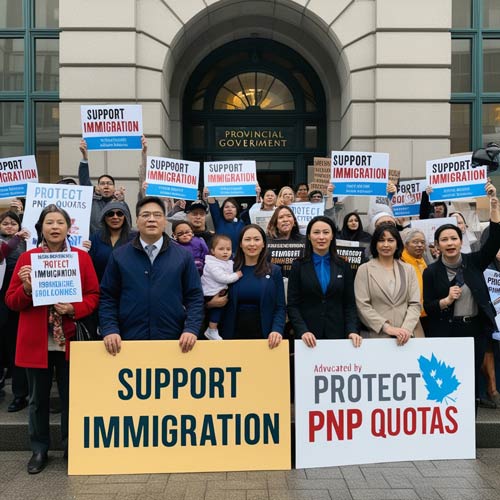Table of Contents
Canada’s immigration landscape is poised for a significant shift as the federal government announces a 50% cut in Provincial Nominee Program (PNP) quotas for 2025, raising widespread concerns among provinces, territories, and immigration stakeholders. The PNP, a vital tool for addressing local labor shortages and fostering economic growth, is particularly crucial for smaller or rural regions reliant on immigration for population and workforce sustainability. The reduction, seen as part of a broader effort to moderate immigration levels, aims to address infrastructure and resource strain but has triggered strong objections from provincial governments worried about economic and demographic repercussions.
With labor markets already experiencing shortages in sectors like construction, healthcare, and tech, the reductions could disrupt regional economies, exacerbate workforce gaps, and heighten competition among prospective immigrants. Smaller provinces such as Manitoba and Saskatchewan, heavily dependent on newcomers to sustain rural communities, stand to feel the greatest impact. Notably, the policy change also underscores the importance of professional legal guidance for hopeful immigrants navigating increasingly competitive pathways like Express Entry.
While these changes present challenges, experts stress the need for collaborative dialogue between federal and provincial governments to balance long-term national goals with regional needs. Immigrants and their representatives are advised to stay informed and seek tailored legal support to navigate the evolving system effectively. As the debate unfolds, Canada’s reliance on immigration as a cornerstone of economic and social development remains a critical consideration in shaping future policies.
New Canada Provincial Immigration Quota 2025 Raises Concerns
In a significant immigration policy shift, the Canadian government has advised provinces and territories to reduce their Provincial Nominee Program (PNP) allocations by 50% for 2025 compared to the prior year. This dramatic reduction has sparked widespread concern among provinces, territories, immigration advocates, and legal professionals specializing in immigration law.
As Canada works toward recalibrating its approach to immigration, the decision to reduce PNP quotas is being interpreted as part of a larger effort to curb overall immigration levels, which could have far-reaching implications for regional economies, labor markets, and immigrant communities across the country. Below, we elaborate on the potential impacts of this new directive, its rationale, and what steps hopeful immigrants and their representatives can take moving forward.

Understanding the Provincial Nominee Program (PNP)
The PNP is a cornerstone of Canada’s immigration framework, allowing provinces and territories to select skilled immigrants tailored to address local labor shortages and bolster regional economic growth. Through agreements with the federal government, provinces nominate individuals who meet specified economic and demographic criteria. These nominations are particularly valuable for regions experiencing population decline and economic challenges, as the system enables a more decentralized approach to immigration.
A reduction in PNP allocations raises serious concerns about the ability of provinces to address labor shortages and attract qualified candidates, especially in smaller or rural communities where population growth has been heavily reliant on immigration.
Rationale Behind the Reduction in Quotas
While the finer details behind the government’s decision remain unclear, the overarching strategy appears to be part of a broader effort to moderate immigration targets nationwide. Recent federal data has shown considerable growth in the number of newcomers to Canada, driven by government objectives to meet economic and workforce demands.
However, this growth has also drawn criticism regarding resource allocation, infrastructure strain, and affordability challenges in certain regions. Policymakers argue the reduced quotas will allow time for Canada’s infrastructure and social services to catch up with prior high immigration intake levels. Notably, public debate continues over whether infrastructure challenges should form the basis for scaling back on immigration given its crucial role in addressing economic and demographic issues.
Provincial and Territorial Responses
The announcement has prompted strong reactions from several provinces and territories, many of which rely heavily on PNP allocations to build their local economies. Regional governments emphasize that these cuts could hinder their ability to fill skilled labor gaps and foster population growth.
For example, Western provinces such as British Columbia and Alberta have expressed concerns about how reductions will impact construction workers, health care professionals, and tech industry talent—all sectors experiencing widespread labor shortages. Meanwhile, smaller provinces like Manitoba and Saskatchewan, which depend on immigration to sustain rural economies and increase population density, could face particularly severe repercussions.
Provinces adhering to the new quotas will have to rethink their strategies to meet existing workforce demands while continuing to attract immigrants in a competitive global market.

Potential Impacts of the 2025 PNP Quota Reductions
Reducing the immigration quotas for the PNP by half could impact various stakeholders:
1. Economic Growth:
PNP nominees play a vital role in maintaining and growing regional economies. Sectors such as agriculture, health care, and construction could suffer without enough skilled workers.
2. Demographics:
Immigration has been a solution to offset Canada’s aging population. Cutting PNP quotas could exacerbate population imbalances, particularly in smaller provinces and rural areas.
3. Immigration Pathways:
Prospective Canadian immigrants may face increased challenges as fewer slots become available, causing greater competition and perhaps forcing them to consider alternative immigration pathways such as the Express Entry system.
4. Community Concerns:
Reduced allocation quotas may also affect the settlement services provided to immigrants and their families, as existing infrastructure focuses on catering to fewer newcomers.
Preparing for the 2025 Changes: Guidance for Immigrants and Legal Professionals
The drastic reduction in PNP quotas underscores the importance of seeking professional legal guidance when navigating Canada’s complex immigration system. For individuals and families planning to immigrate to Canada, consulting a seasoned immigration attorney can help identify alternative pathways and ensure that applications are comprehensive and competitive.
At Sohi Law Group, we specialize in simplifying the immigration process for our clients, even as federal policies evolve. Whether you’re looking to apply through the PNP or another federal program like Express Entry, our team offers personalized services tailored to your unique circumstances. With experienced professionals who are well-versed in the implications of these changes, we can help you maximize your chances of success.
A Path Forward for Affected Communities and Applicants
While the Canadian government’s decision to halve PNP quotas has raised considerable concerns, it’s essential to remember that immigration remains a cornerstone of Canada’s social and economic fabric. Stakeholders, including legal professionals and community leaders, are calling for open dialogue between federal and provincial governments to ensure that these policy changes account for both long-term national goals and local needs.
For immigrants and potential nominees, staying informed about Canadian immigration programs and regularly consulting with legal experts will be key to navigating this shifting landscape. The Sohi Law Group is committed to guiding our clients effectively through these complex transitions, safeguarding their futures in Canada.
Closing Thoughts
As Canada adjusts its immigration policies for 2025, it’s clear that the halving of PNP quotas will introduce challenges for provinces, businesses, and applicants alike. Nevertheless, these challenges also highlight the necessity for careful planning and expert legal support. The Provincial Nominee Programs in Manitoba and Alberta continue to open doors for skilled immigrants, creating opportunities for both workers and local communities.
If you are affected by these changes or would like to explore your immigration options, Sohi Law Group stands ready to assist. Our priority is ensuring that every client receives the highest standard of guidance and advocacy, no matter how intricate the process becomes. Due to unforeseen challenges, the Northwest Territories Nominee Program has been delayed until further notice





No comment